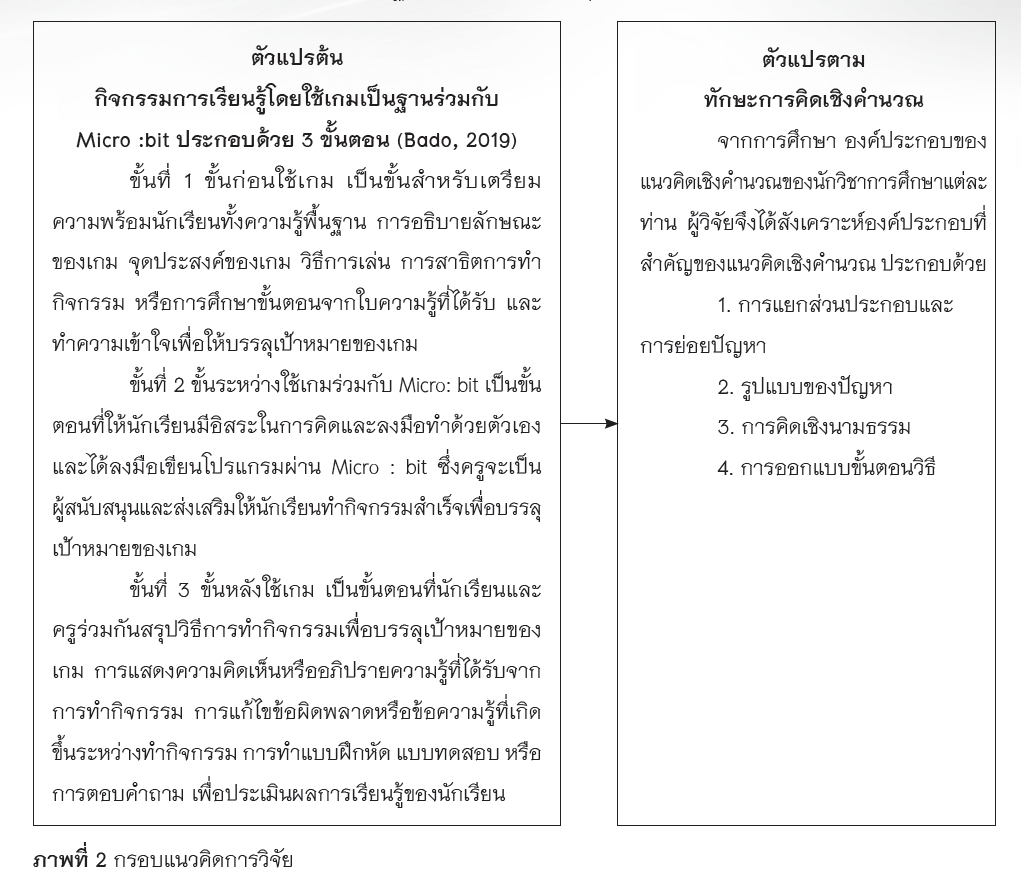The Development of Learning Activities Using Game-Based Learning with Micro: Bit to Enhance Computational Thinking Skill for Matthayomsuksa 1 Students Pamaiutid 4 School
Main Article Content
Abstract
The purposes of this research were to: 1) construct and evaluate the efficiency of the learning activities using game-based learning with Micro: bit to enhance computational thinking skill for Matthayomsuksa 1 students at Pamaiutid 4 school, aligning with the 75/75 criteria; and 2) compare computational thinking skills before and after the implementation of game-based learning with Micro: bit among Matthayomsuksa 1 students at Pamaiutid 4 school. The sample consisted of 30 Mathayomsuksa 1 students, studying in the second semester of the 2022 at Pamaiutid 4 School, Tak Secondary Educational Service Area Office 2 selected by simple random sampling. This research used one group pretest-posttest design. The research instruments included learning activities using game-based learning with Micro: bit and computational thinking skill test. Data were analyzed using mean, standard deviation, and t – test.
The research results revealed that: 1. The learning activities cover five topics: 1) basic algorithm 2) writing algorithm using natural language 3) writing algorithm using pseudo code 4) writing algorithm using flowcharts, and 5) computer programming derived from algorithm. The results of appropriateness of learning activities were at the highest level (= 4.65 S.D. = 0.39), with an efficiency of 75.56/73.89, meeting the specified criteria.
2. Students had computational thinking skill after learning with learning activities using game-based learning with Micro: bit l for Matthayomsuksa 1 student. It was higher than before learning and statistically significant at the .05 level.
Downloads
Article Details

This work is licensed under a Creative Commons Attribution-NonCommercial-NoDerivatives 4.0 International License.
References
Al-Azawi, R., Al-Faliti, F., & Al-Blushi, M. (2016). Educational gamification Vs. game based learning: Comparative study. International Journal of Innovation, Management and Technology (IJIMT), 7(4), 131-136.
Bado, N. (2019). Game-based learning pedagogy: A review of the literature. Interactive Learning Environments, 30(5), 936-948.
Boontueng, S. (2019). Development of proficiency in writing and using java script block editor on micro: bit of grade 8 students in the subject area of occupation and technology. (Master of Education in Curriculum and Instruction Suryadhep Thachers College, Rangsit University). [In Thai]
Buason, R. (2019). Research and development of educational innovations. (2nd ed). Phitsanulok: Buagraphic. [In Thai]
Digital Economy Promotion Agency. (2019). Workshop training course promoting learning to develop coding skills for future digital society. Bangkok. [In Thai]
Donpasit, S. (2021). Guidelines for education management to develop manpower in the 21st century. Journal of Teacher Professional Development, 2(1), 1-15. [In Thai]
Duangnate, N. (2021). Effects of using game learning in mathematics on computational thinking of elementary schools’ students. (Master of Education, Curriculum and Instruction, Chulalongkorn University). [In Thai]
Emsomboon, W. (2021). Effects of using game-based inquiry learning instruction on scientific reasoning ability of upper secondary school students. (Master of Education, Curriculum and Instruction. Chulalongkorn University). [In Thai]
Gibson, S. and Bradley, P. (2017). A study of Northern Ireland key stage 2 pupils ‘perceptions of using the BBC Micro: bit in STEM education. The STeP Journal, 4(1), 15-41.
Jrompang, K. (2022). Effect of game-based learning management on computational thinking skill and learning motivation in computing science course for grade 4 students. (Master of Education, Chiangmai University). [In Thai]
Kaemmanee, T. (2007). The science of teaching knowledge for an effective learning process. (10th ed). Bangkok. [In Thai]
Kazimoglu, C., Kiernan, M., Bacon, L., & Mackinnon, L. (2012). A Serious Game for Developing Computational Thinking and Learning Introductory Computer Programming. Procedia - Social and Behavioral Sciences, 47, 1991-1999.
Professional and Organizational Development Network of Thailand Higher Education. (2022). Game-based learning. Retrieved from https://active-learning.thailandpod.org/learning-activities/game-based-learning [In Thai]
Saengsiri, M. (2018). Learning microcontroller (Micro: bit). Retrieved from https://www.scimath.org/articletech nology/item/8667-micro-bit. [In Thai]
Srisaard, B. (2004). Statistical methods for research. (4th ed). Bangkok: Suweriyasan. [In Thai]
The Institute for Promotion of teaching Science and Technology IPST. (2017). Basic science curriculum manual technology (Computational Science) elementary and secondary education. Retrieved from https://www.scimath.org/e-books/8376/8376.pdf. [In Thai]
Wing, J. M. (2006). Computation thinking. Communication of the ACM, 49(3), 33-36.


